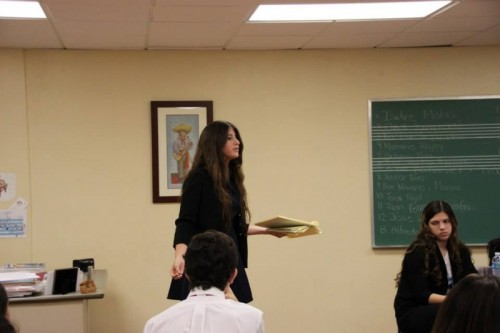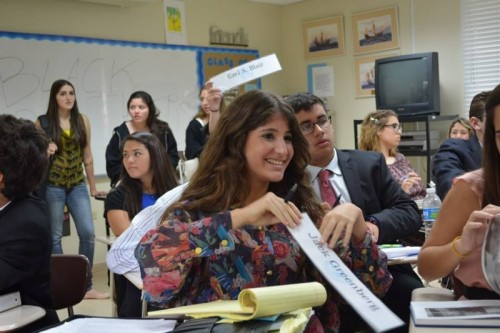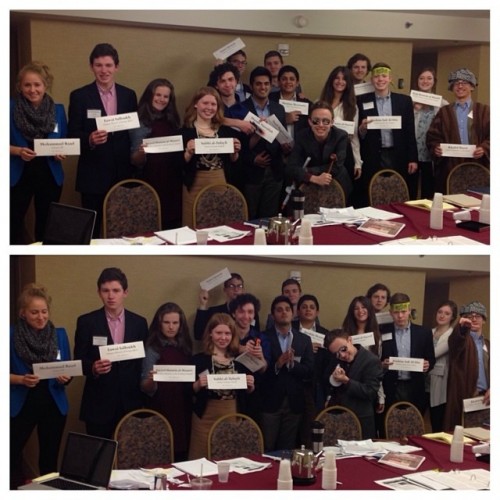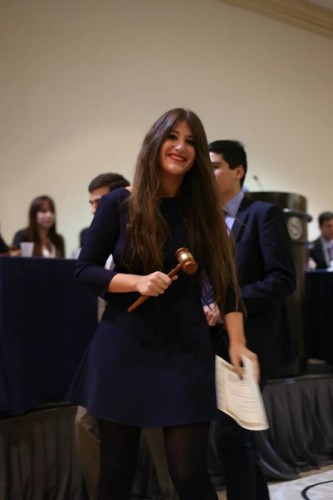Article submitted by Carmen Ana Nieto*
*Carmen Ana Nieto is a Junior at Colegio Puertorriqueño de Niñas in Guaynabo, Puerto Rico, and the recipient of the Best Delegate award in the Joint Crisis Committee (JCC): Hezbollah at ILMUNC XXX. Colegio Puertorriqueño de Niñas received the Best International Delegation award in ILMUNC XXX. You can contact her at nananieto11@gmail.com.
Model UN has shaped the way in which I see and think about the world. My journey in Model UN began four years ago, when I was thirteen. Unlike many places in the United States, Model UN clubs in Puerto Rico belong to local associations that hold competitions throughout the year. My school belongs to an association called the Federation (“La Federación” in Spanish). “La Federación” is comprised of seven member schools and holds five local competitions every school year. In these competitions, Model UN club members have the opportunity to compete as delegates and are also given the chance to serve as chairs of the various committees.
Having local competitions on a regular basis gives delegates the chance to practice and improve their skills. The benefits of this structure were recognized by Best Delegate co-founder Kevin Felix Chan in an article he wrote on Model UN in Puerto Rico where he stated: “the development of a local circuit is something that can greatly benefit other local Model UN communities if they emulate it” (The Only Formal Circuit in the World: Structural and Cultural Lessons from La Federación in Puerto Rico by KFC on October 15, 2012).
In addition to these local conferences, Model UN clubs in Puerto Rico also participate in competitions in the United States. The schools that belong to “La Federación” usually attend the Ivy League Model United Nations Conference (ILMUNC) hosted by The University of Pennsylvania.
My experiences with ILMUNC began when I was in the 8th grade, when I was the youngest student to attend from my school. During my first competition in 2011, I participated in ILMUNC’s first Historical General Assembly (HGA), a humanitarian, single-delegation committee. My second and third year, I participated in UNESCO and ECOFIN, both of which were single-delegation committees.
Although the debates in the committees I participated in during my first three ILMUNC’s were very different, they all shared the same structure and protocol. In these “classic committees” the main objective is to pass resolutions. Delegates must come prepared to offer specific solutions to solve the issue at hand. The real challenge that delegates face in these committees is the difficulty with the presentation of their ideas and the building of support from the international community in order to pass a resolution.
For all Model UN competitions, the chairs and moderators of each committee prepare detailed background material for the delegates participating in that committee. These materials are essential to guide the research that every delegate will conduct in preparation for the competition.
Unlike competitions in classic committees where delegates represent countries and follow a well-established policy, crisis simulation committees have delegates that usually represent high-ranking individuals such as presidents and cabinet members.
Crisis committees are smaller in size than traditional committees and this enables the chair to prepare a general description on each “person” (or delegation) within the background guide. These profiles establish the delegate’s portfolio powers within the committee. Portfolio powers are the functions and responsibilities that each person in the committee can perform. For example, if you are participating in a Cold War Crisis committee and you are the head of the intelligence division, your portfolio powers enable you to contact the KGB and work with undercover spies. Yet, if you represent the Soviet Prime Minister, your powers do not enable you to do such things.
While portfolio powers establish each delegate’s role and limitations in the committee, they should never affect a delegate’s ability to draft plans and strategies that could be supported later on by other delegates who have different portfolio powers, including those powers that are actually necessary to perform specific actions.
The overall purpose of crisis committees is to create and accelerate a sequence of events that delegates will deal with through directives, press releases, and communiqués. Directives are documents that are drafted by delegates in the committee to call for action. For example, a group of delegates can draft a directive specifying how many soldiers and weapons are being mobilized towards a given region. If this directive is voted on by the majority of the committee, it passes and events begin to occur. Press releases are documents that are drafted to notify, via the press (CNN, BBC, Al Jezeera, etc.), any statements that the delegates wish to make public. Finally, communiqués are documents that inform direct information to the crisis staff, to the second cabinet of a JCC, or to another entity, that could be made public at the discretion of the chair.
The skills that delegates need to develop in regular committees are somewhat different from those required of crisis committee delegates. In regular committees, delegates must be approachable, yet firm in their leadership. They must have strong control over their group and at the same time be inclusive of all delegates who wish to participate. They have to be devoted and persistent with their ideas in order to demonstrate that they know and follow their country’s policy.
On the other hand, delegates who compete in crisis committees need to be fast-thinkers and they need to learn how to balance and manage their time. Delegates tend to get involved in the committee’s debate and they forget the presence of the crisis staff, or vice versa. It is imperative for delegates to be constantly sending questions or communiqués to the crisis staff, while at the same time, staying involved in the current debate and what is taking place at the time. This balance ensures that the delegate is active on both sides of the crisis simulation.
I had the opportunity to participate in this type of committee for the first time this year, during ILMUNC XXX, on the Joint Crisis Committee (JCC): Hezbollah. A JCC is a committee that is divided in two independent cabinets while a crisis staff coordinates their interactions. Although both committees run at their own pace, the decisions and actions made in each committee affect the crisis that is being developed “behind the scenes”. Thus the committees tend to be unpredictable, Machiavellian, volatile, and all-around exhilarating. The participants in this years’ JCC at ILMUNC were the Israeli cabinet and Hezbollah during the 2006 war in Lebanon.
This JCC in particular was very military-oriented. Us delegates had to prepare on military tactics and strategies, weapon use and implementation, a clear geographic perspective on the region, and a specific understanding of the political and religious disputes between both sides. As a result of the radical nature of the Hezbollah cabinet members and of the western influence of the Israeli, the delegates faced a dynamic and fast-paced committee that required lots of quick critical thinking.
From the beginning of the crisis committee, the most important factor was establishing and recognizing the delegates’ portfolio powers and to assess to what extent they could be used to take an advantage in the conflict. As events developed through comprehensive directives, detailed press releases, and, on certain occasions, covert communiqués, the crisis staff created multiple crises that delegates had to respond to, challenging our ability to think on our feet and work collectively to get ahead.
It was very exciting to be in a room surrounded by a group of passionate and devoted delegates, a feeling that is not usually present in regular committees. It was interesting to see how we fed off of each other’s energy and got so intensely into the situations that were taking place. Because of the small size of crisis committees, every delegate in the room got to showcase his or her opinion and ability to react under pressure.
One of the things I liked the most about crisis simulations is the independent (or collective) covert operations. You cannot fully trust anyone in the committee setting, for delegates could be planning something completely undercover that will eventually surface during the course of the conference. From planned assassinations, to the infiltration of “quadruple spies”, JCC: Hezbollah proved to be a stimulating and thought-provoking committee. As delegates, we were always busy and had to think three steps in advanced in order to keep up with the crisis staff and the hectic atmosphere that surrounded us.
Throughout the course of the committee, and as the war began to intensify, directives became an essential tool. At first, the delegates would draft individual directives containing the minimum amount of sponsors required. But with the help of our chair, we learned that it is more important to invest time in drafting directives collectively that can be sponsored by the entire committee. Such directives show that everyone in the committee favors the course of action taken and that all delegates had an active role in achieving the established goals. “That is what impresses me” said the Chair of JCC: Hezbollah, Theodore Schneider.
My overall feedback on crisis committees, specifically JCC’s, is that they are a very valuable for experienced delegates; it takes them to the next level. Crisis Simulation Committees force delegates to think about the issues they have researched and to use their creativity and ingenuity. I hope to participate in more JCC’s and Crisis Simulations in the remainder of my high school career, in order to grow and expand my abilities as a Model United Nations delegate.





